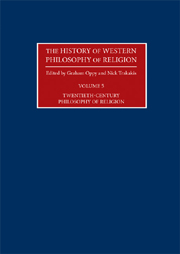Book contents
- Frontmatter
- Contents
- Editorial Introduction
- Contributors
- 1 Twentieth-Century Philosophy of Religion: An Introduction
- 2 William James
- 3 Henri Bergson
- 4 John Dewey
- 5 Alfred North Whitehead and Charles Hartshorne
- 6 Bertrand Russell
- 7 Max Scheler
- 8 Martin Buber
- 9 Jacques Maritain
- 10 Karl Jaspers
- 11 Paul Tillich
- 12 Karl Barth
- 13 Ludwig Wittgenstein
- 14 Martin Heidegger
- 15 Emmanuel Levinas
- 16 Simone Weil
- 17 A. J. Ayer
- 18 William P. Alston
- 19 John Hick
- 20 Mary Daly
- 21 Jacques Derrida
- 22 Alvin Plantinga
- 23 Richard Swinburne
- 24 Late-Twentieth-Century Atheism
- Chronology
- Bibliography
- Index
6 - Bertrand Russell
- Frontmatter
- Contents
- Editorial Introduction
- Contributors
- 1 Twentieth-Century Philosophy of Religion: An Introduction
- 2 William James
- 3 Henri Bergson
- 4 John Dewey
- 5 Alfred North Whitehead and Charles Hartshorne
- 6 Bertrand Russell
- 7 Max Scheler
- 8 Martin Buber
- 9 Jacques Maritain
- 10 Karl Jaspers
- 11 Paul Tillich
- 12 Karl Barth
- 13 Ludwig Wittgenstein
- 14 Martin Heidegger
- 15 Emmanuel Levinas
- 16 Simone Weil
- 17 A. J. Ayer
- 18 William P. Alston
- 19 John Hick
- 20 Mary Daly
- 21 Jacques Derrida
- 22 Alvin Plantinga
- 23 Richard Swinburne
- 24 Late-Twentieth-Century Atheism
- Chronology
- Bibliography
- Index
Summary
Bertrand Russell (1872–1970) wrote much and repeatedly about religion, and an examination of what he had to say yields surprising results for anyone whose knowledge of his views stops at knowing only that he did not believe in the existence of a god or gods, and that he was a trenchant opponent of organized religion and a castigator of what he saw as its harmful effects on human individuals and society. All this is true; but what is even more interesting is that he was deeply concerned to find an alternative to religion as a source of value and a motivator to action aimed at the good. He wrote: “I am constantly asked: What can you, with your cold rationalism, offer to the seeker after salvation that is comparable to the cosy home-like comfort of a fenced-in dogmatic creed?” (1952: 80); and the person who most often asked him this question was himself.
When, in that same passage, he continued, “To this the answer is many-sided” (ibid.), he was adverting to the fact that he had tried, and was then in the midst of trying, to find what one might best call a humanistic alternative. This was not an expression he himself used, but it is the closest term in the current lexicon of debate that captures his intentions.
- Type
- Chapter
- Information
- The History of Western Philosophy of Religion , pp. 69 - 78Publisher: Acumen PublishingPrint publication year: 2009



